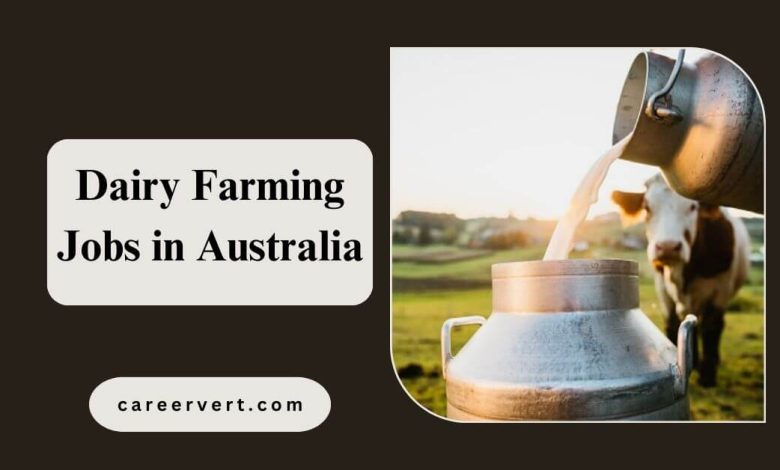Dairy Farming Jobs in Australia 2025 – Visa Sponsorship

Dairy farming in Australia is a dynamic industry that is dedicated to the satisfaction of dairy specialists and the local communities in which they operate. The demand for dairy is expected to increase globally as Asian countries with large populations adopt elements of a more Westernized diet. Drain, cheese, butter, yogurt, cream, custard, whey, and ice cream are all experiencing a global decline in popularity.
The widespread availability of dairy products has created lucrative new career opportunities for individuals seeking dairy employment in Australia’s dairy regions, particularly in the fields of crowd health and computerization. There is no limit to the potential destinations of a dairy vocation, as approximately 6000 dairy ranches are located in Australia, often in close proximity to major cities.
Check Also: Visa Sponsorship Poultry Farm Jobs in Australia – Apply Now
The dairy industry has undergone significant transformations since the tranquil era of antiquity. Our dairy cultivate contacts have witnessed the mass migration of numerous smaller dairy ranches and the emergence of larger, more modern dairy operations with expanded yields, which periodically necessitate the next volume of staff and staff with specific skills.
An additional initiative that is constructive Currently, a critical aspect of the dairy industry is the improvement of animal conditions. The Australian dairy industry and our clients are dedicated to the optimal well-being and welfare of the community, and they maintain the highest standards of animal welfare.
Key Points:
- Country: Australia
Job: Dairy Farming Jobs
Experience: 2-3 Years
Age: 20-45
Who can Apply: All Nationalities
Salary: $47,621
Visa Sponsorship: Yes
Requirements for Dairy Farming Jobs in Australia:
- Confirmation of high school or an equivalent institution
- More than 18 years of age a lengthy time
- 1+ a significant period of involvement in the development of labor, daily work
- Capacity to engage in physical labor
- Curriculum in the field of creature science
- Driver’s license that is valid and a clear foundation check
- Proven communication skills are essential for effectively collaborating with cultivate staff, veterinarians, and other industry professionals.
- Capacity for problem-solving and decision-making to confront obstacles and make informed decisions
- Aptitudes in business administration to manage budgets, accounts, and marketing
- The ability to labor outdoors in a variety of climate conditions and physical stamina
- Consistent attention to detail and the ability to adhere to rigorous standards for food safety and animal welfare
Responsibilities for Dairy Farming Jobs in Australia:
- To ensure that all dairy animals remain robust and produce high-quality milk, they should be monitored for any indications of potential illness.
- Dairy cattle are able to produce the highest quantities of milk because they ensure that the animals remain tranquil and comfortable.
- Weigh bovines, inspect for any physical indications of illness or injury, and administer preventative restorative care.
- Review the pens, buildings, and other ranges to ensure that they remain sterile, thereby reducing the risk of injury and illness to the cattle and cultivators.
- Ensure that cattle are provided with water and sustenance, and that the necessary supplies are consistently available to prevent the animals from going famished.
- Administer medications, vaccinations, and other therapeutic treatments, and consult with veterinarians as necessary.
- Proficiently transport supports, creatures, and other equipment to the appropriate locations on the farm using instruments.
- Ensure that vehicles, tractors, draining gear, and other equipment are in proper working order and that repair costs are minimized by maintaining them.
- Ensuring the health of animals and administering essential remedies
- Maintaining precise cultivate records and recording information
- Supervising the generation and processing of drains
- Managing the farm’s budget and making decisions
- The implementation of environmentally favorable and sustainable cultivation practices
- Marketing and distributing dairy products to local or national markets
Benefits of Dairy Farming Jobs in Australia:
- Competitive Compensation: Dairy farming positions in Australia frequently provide an attractive salary, which frequently includes overtime and supplementary allowances.
- Visa Sponsorship Opportunities: The immigration procedure for foreign workers is simplified by the sponsorship of work visas by numerous dairy farms.
- Residency Pathway: The Regional Sponsored Migration Scheme is a program that can qualify individuals for permanent residency if they work in the agricultural sector.
- High Demand for Workers: The dairy industry in Australia is expanding, resulting in a consistent demand for both professional and unskilled labor, which guarantees job security.
- On-the-Job Training: Workers frequently receive hands-on training to enhance their proficiency in contemporary dairy farming methods.
- Access to Benefits: Numerous positions include healthcare, paid leave, and retirement contributions as part of the employment package.
- Diverse Employment Opportunities: The positions available are diverse, encompassing a wide range of skills, from machinery operation and farm administration to milking and feeding.
- Work-Life Balance: The majority of dairy farms adhere to established schedules, which provide ample time for personal and family activities.
- Exposure to Advanced Practices: The utilization of state-of-the-art technology on dairy farms in Australia offers valuable experience in contemporary agricultural methods.
- Peaceful and Scenic Work Environment: The opportunity to experience a tranquil lifestyle and stunning landscapes is available in rural Australia.
Salary:
An average salary of $47,621 is earned by a dairy cultivating laborer at the passage level, who has 1-3 years of experience. In contrast, an average compensation of $52,494 is received by a senior-level dairy cultivating specialist with eight or more years of experience.
How to Apply?
- Visa. You will be required to determine the visa that is most suitable for your needs. To be more precise, there are a multitude of unique work-related visas. To commence true application, you must possess one. An isolated area beneath “Work visa in Australia” contains additional topics of interest.
- Resume/cover letter. Ensure that your resume and cover letter are both customized and well-prepared. Do not employ the same ones that you used for job hunting in your home country. Additional information is contained in a separate section that is located beneath the “Continue and cover letter tips.”
- TFN/ABN. If you have recently commenced employment, you may wish to acquire an Access Record Number (TFN), which is analogous to your social security number. An Australian Trade Number (ABN) is necessary for self-employed individuals. Both are available for request online.
- Account with an Australian bank. You are interested in fulfilling this requirement as soon as possible after commencing employment. Once you arrive in Australia, it is possible to establish it online.
- Job search engines. After you have finished the aforementioned tasks, go to online job search engines that are specific to Australia. An isolated segment beneath “Australian job search engines” contains additional subtle elements.
- Submit your application in person. This is typically true for professions that do not necessitate specific skills. Dropping in to test your fate is all that is required.
Frequently Asked Questions:
-
How can I secure employment on a farm in Australia?
To work on a farm in Australia, you will need a valid work visa. The Working Holiday visa (subclass 417) and the Work and Holiday visa (subclass 462) are popular options for those seeking farm work opportunities. The Working Holiday visa allows you to work and travel in Australia for up to 12 months.
-
What do dairy farmers do?
A dairy farmer is involved in the production of milk and other dairy products from dairy cattle. These farmers are responsible for the care and management of dairy cows, ensuring their health and well-being in order to optimize milk production.
-
What is the work of dairy?
Dairy farming is a class of agriculture for the long-term production of milk, which is processed (either on the farm or at a dairy plant, either of which may be called a dairy) for the eventual sale of a dairy product.


